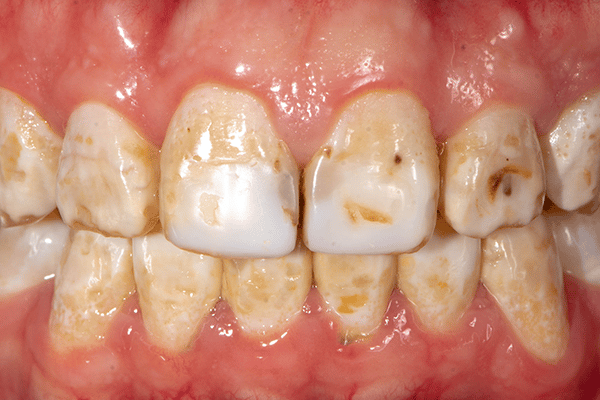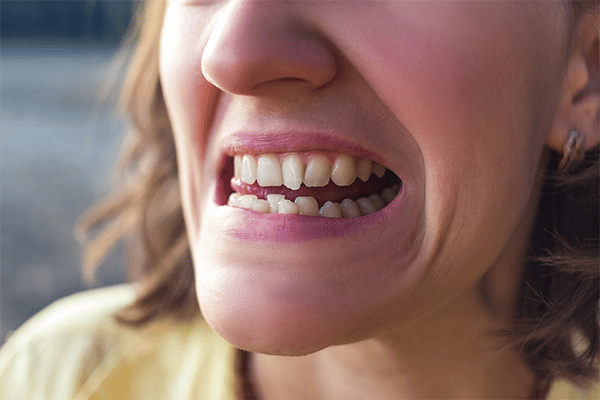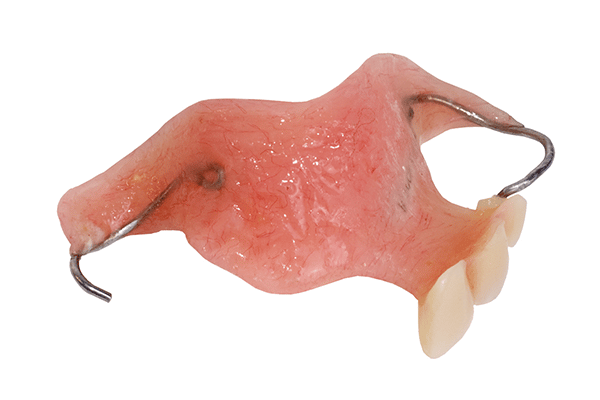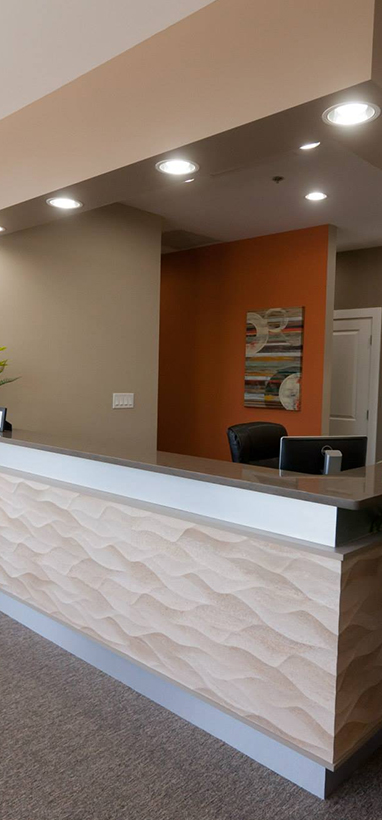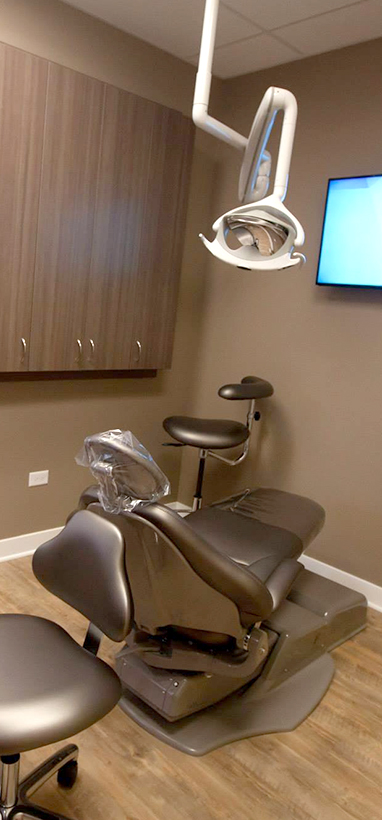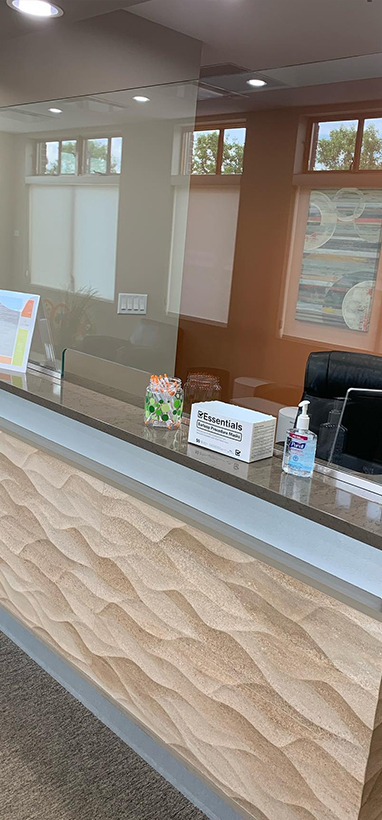1516 Legacy Cir, Naperville, IL 60563
Sensitive Teeth and its Treatment
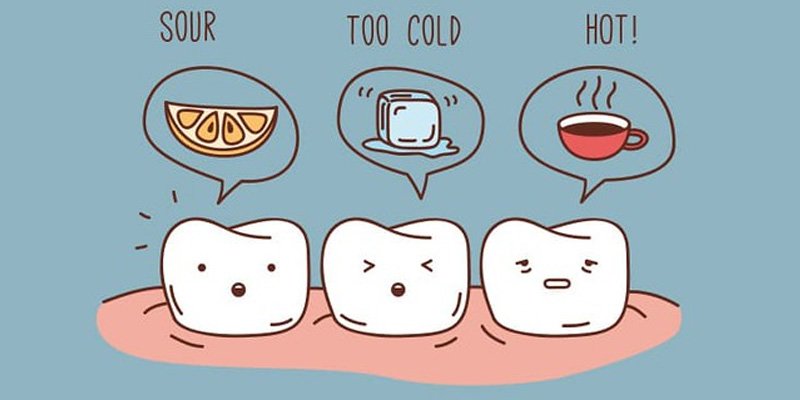
Patients with sensitive teeth are very common. Some patients may wonder, “why is my tooth sensitive to cold?” or “why is my tooth sensitive to heat?” In most cases, unfortunately, people are sensitive to both hot and cold. Sometimes people are sensitive to sweets as well. It can be frustrating for people when they are trying to enjoy various foods and beverages, but there are many solutions to people who face this issue on a daily basis.
What Causes Sensitive Teeth
Sensitive teeth are typically the result of exposed dentin. Dentin is the second layer of the tooth under the enamel. When the tooth or gum tissue is damaged and areas of the tooth are exposed, sensitivity occurs.
The dentin layer is made up of tubes that lead directly to the nerve of the tooth. When the dentin is exposed, patients experience pain as a nerve response.
Specific causes for sensitive teeth include
- Aggressive tooth brushing,
- Acidic foods,
- Gum recession,
- Cracked teeth,
- Teeth grinding,
- And dental procedures.
Aggressive tooth brushing can cause erosion of the enamel. The top layer of the tooth, called the enamel, will eventually be worn down and the second layer of the tooth can become exposed when teeth are brushed too aggressively. Also, certain foods or drinks that are considered acidic, such as soda and lemons, can erode the enamel away from the teeth over time. This process makes them weak and sensitive to temperature.
Gum recession can also cause sensitivity. When the gum tissue begins to recede, the root of the tooth becomes exposed. This can cause major sensitivity to a patient, especially to hot or cold foods and drinks, because it is normally covered by the gum tissue. Cracked teeth are another way that the inner layers of the tooth can become exposed. Depending on how severe the fracture is, sometimes even the nerve of the tooth can become exposed.
Lastly, dental procedures can cause tooth sensitivity in some patients. When a dentist needs to cut through a tooth, typically to fix a cavity, the body needs time to heal afterwards.
It is very common, and almost expected, for a patient to have sensitivity to temperature and biting pressure immediately after a filling or crown is completed. Depending on how fast each patient’s body is able to heal, this process can sometimes last weeks or even months.
It is important to not be worried about minor sensitivity after a dental procedure. If the sensitivity gets worse and lasts for an extended period of time, it is usually best to schedule a follow up visit with your dentist to make sure that no further adjustments need to be made to the area.
Sensitive Teeth Treatment
Common, effective treatments for sensitive teeth include
- fluoride varnish,
- wearing a night guard,
- fluoride rinses,
- anti-sensitivity toothpastes, and
- avoiding acidic foods.
Most dental offices offer a “paint-on” fluoride varnish that can be applied directly to the teeth to combat sensitivity. The sodium fluoride will fill the dentin tubules and block fluid movement. By blocking the pathway to the pulp, the nerve response for pain is blocked. Not only will fluoride varnish help with sensitivity, but it can help to prevent cavities by remineralizing weak areas in the enamel.
It is best to coat the teeth right after a dental cleaning appointment. The effects of fluoride varnish can last about three to four months, and it is recommended that it is applied at each visit.
Another treatment for sensitive teeth is wearing a mouthguard at night. Patients who grind their teeth, whether it be during the day or at night, will eventually wear the tooth’s enamel away. Gum recession can also occur as a result from this pressure. When enamel is worn away, the second layer of the tooth, known as the dentin, becomes exposed.
As mentioned previously, the dentin contains tubules that lead directly to the nerve, or pulp, of the tooth. Also, recession that occurs from teeth grinding, also referred to as bruxism, will expose part of the tooth that is typically covered by gum tissue.
Patients with untreated bruxism will often experience tooth sensitivity from these exposed areas of dentin. Although they will not fix damage that is already present, custom night guards can be made to help alleviate this issue.
Another method patients use to combat sensitivity is using mouthwash. Using mouth rinses that contain fluoride at home will help strengthen the enamel on your teeth, thus making them less sensitive.
Although the fluoride content is not as high as fluoride varnish applied in the dental office, it is an effective way to continue fighting cavities and sensitivity on a daily basis at home.
Anti-sensitivity toothpaste is another great way to help with tooth sensitivity as well. Sodium Fluoride and Potassium Nitrate are the active ingredients in these types of toothpastes that fill in the tubules in the tooth that lead to the nerve. Using these on occasion can lessen sensitivity to hot or cold foods and drinks.
Lastly, it’s important to consider the pH of foods that are being consumed. Before having something acidic, such as soda, try to have it in one sitting rather than sipping all day long. Each sip of soda will put the mouth at an acidic level for 20 minutes. If the soda is consumed over an hour, that means that the mouth is most likely at an acidic level for an hour and 20 minutes.
By consuming acidic foods and beverages in a shorter amount of time, the pH of the mouth will be at a neutral state for longer. Another solution to bring the acidity levels down quicker is to drink or swish with water after consumption of something acidic.
These solutions will keep the enamel strong, thus decreasing the risk for sensitivity. We offer custom night guards, fluoride varnish application, and more at our office. All of these options can be discussed at your next dental visit. Call us today to learn more!


